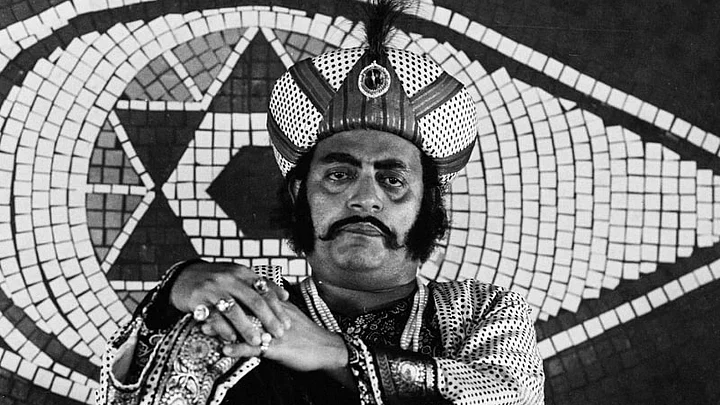Ever since Satyajit Ray's centennial birthday (May 2, 2021), admirers of the maestro across the globe have been celebrating his legacy by revisiting his extraordinary body of work.
Though not known for making overtly political films like his Bengali contemporary Mrinal Sen, there is one film by the 6'4" tall auteur that stands taller than most politically charged movies made in this country. Disguised as a children's film, Hirak Rajar Deshe (In the Land of the Diamond King, 1980) was a cleverly satirised indictment of Indira Gandhi’s emergency regime. Prophetically, the allegorical film holds a mirror to some of the current fascist regimes as well. Therefore, it didn't come as a surprise when Ray's son Sandip - an accomplished filmmaker in his own right - stated in a recent interview that had his father been alive in these times, perhaps he would have made Hirak Rajar Deshe: Part II.
A sequel to Ray's 1969 film Goopy Gyne Bagha Byne, this dystopian tale blends elements of fantasy, science-fiction, humour, and music to create a lyrical parable that advocates rebellion against totalitarianism. The kingdom of Hirak, famous for its diamond mines, is ruled by a narcissistic king (Utpal Dutt) with an iron fist. Burdened by heavy taxes and gruelling work conditions, the cries of farmers and labourers fall on the king's deaf ears.
The tyrannical ruler's inner circle consists of cabinet ministers who mindlessly echo his sadistic views without daring to disagree with him. Aren't we reminded of certain self-styled "supreme leaders" in the real world?
In Hirak Rajar Deshe, any subject having a dissenting voice is brainwashed in a laboratory operated by the king's scientist. The mind-altering programme renders the subjects incapable of rational thoughts and they simply parrot the phrases fed to them; quite similar to the shakhas of organisations where members are 'groomed' and 'trained' to devote themselves to a particular ideology. The king fears the revolutionary power of education. Therefore, he orders his men to shut down the school in his kingdom and burn all books of the righteous teacher Udayan Pandit (Soumitra Chatterjee). According to him, "The more people learn, the more they know; hence the less they would follow orders." This is precisely why insecure and oppressive regimes impose clampdowns on educational institutions that foster a tradition of questioning authority.
The job of the court poet in the film is to create rhyming songs that propagate lies about the state of affairs and glorify the king with heaps of praises. Don't we find a striking similarity in the modus operandi of the IT cell of a holier-than-thou political party? The school students are falsely taught: "one who studies too much, dies of starvation" and "there is no end to knowing, hence the desire to acquire knowledge is futile". Tyrants thrive on the carefully crafted image they build of themselves. The king, who has invited external guests from other kingdoms to showcase the grandeur of his anniversary celebrations, orders his ministers to erase any sign of poverty around the path to his palace. After all, projecting an image of a 'clean and shining nation' is necessary to keep the pride intact!
While the masses of Hirak starve and are subjected to inhuman treatment, the megalomaniac king misuses the state treasury to aggrandise his ego by getting a giant statue of himself constructed. Unfortunately, such political rulers continue to exist in our world too, who wallow in obnoxious luxury, turning a blind eye to the miseries of their fellow men.
The only enemy of the king in his land is the teacher Udayan who dares to oppose him and expose his falsehood. A unique aspect of the film is that most of the dialogues exchanged by the protagonists are rhyming. The only person who does not speak in rhyme is the teacher, symbolic of being a free-thinker, unlike others who are mere puppets of the king. Udayan could tell right from wrong.
With the help of his students and the magical powers of Goopy (Tapen Chatterjee) and Bagha (Rabi Ghosh), Udayan manages to stage a revolt against the king. The fascist regime is overhauled owing to the heroics of Goopy and Bagha, reminiscent of the Cuban revolution that produced two heroes, Fidel Castro and Che Guevara, responsible for ending Batista's dictatorship. However, in our present-day world, a few countries are still plagued by autocratic rule under the garb of democracy, and they need many Udayans, Goopys, and Baghas to fight fascism. Hence, a timeless film like Hirak Rajar Deshe will continue to be relevant and resonate with society as long as evil men hold positions of power.
Hirak Rajar Deshe is currently streaming on Amazon Prime Video with subtitles.
(Arun A.K. writes on films and contributes to several publications. He tweets at @arunusual. This is an opinion piece and the views expressed are the author’s own. The Quint neither endorses nor is responsible for them.)
(At The Quint, we question everything. Play an active role in shaping our journalism by becoming a member today.)
